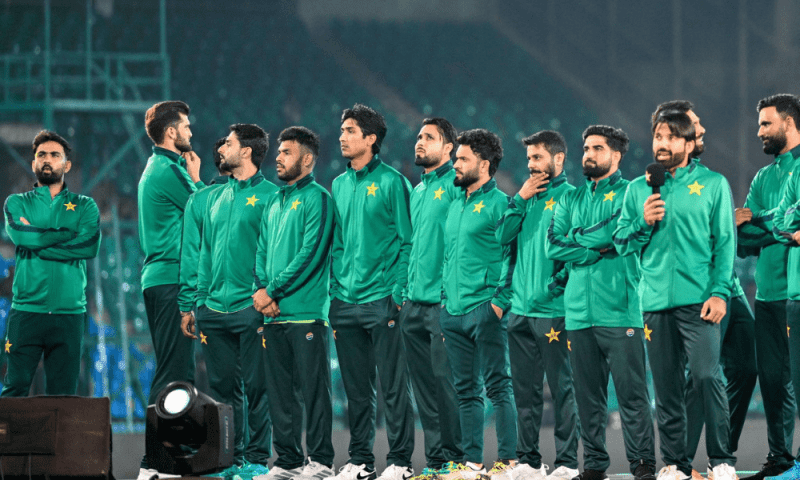
Here’s the strategy: temper your hopes so that when things don’t pan out as expected, you only need to wallow in disappointment for a day or two, rather than dragging it out for an entire week.
The objective is straightforward. This isn’t one of those rallying cries about how “we’re Pakistanis, we will triumph,” as we’ve seen that many times on this platform already. Such narratives usually lead to frustration and mockery from that friend or colleague who doesn’t care for cricket but relishes reminding you of the missteps the next day.
Therefore, let’s avoid that path. However, if you’re still inclined towards bravado, you can tune into various sensational news outlets for your pre-tournament booster on why victory is imminent this time around.
What we want to do here is prepare you for the possibility of disappointment. So, if the expected outcome unfolds around late February or early March, you might find yourself upset for just a brief moment, rather than letting it linger into a week-long dread.
Let’s get to the crux of the matter:
Aqib Javed Is Not the First Option
In the world of sports, teams often strategize for upcoming tournaments years in advance, especially if they are defending champions on their home turf. As for the Pakistan Cricket Board? [Insert the classic meme: “We don’t do that.”]
The signature style of Pakistan’s preparations for big events has always been last-minute unpredictability—abandoning Plans A, B, and C for an entirely untested Plan S, which seems to be plucked from thin air.
Since Mickey Arthur left in the summer of 2019, Pakistan has had nine different individuals assume the role of head coach for various formats. That translates to more than 1.5 coaches annually, something that would certainly make the former Roman Abramovich proud.
When Gary Kirsten was appointed as head coach just one month before the disastrous T20 World Cup, there was hope that he would lead the team through the Champions Trophy as well. Yet, as we approach the Champions Trophy 2025, Kirsten is nowhere to be seen after resigning in October. So much for Plan A.
Now, the man stepping into Kirsten’s shoes is Aqib Javed. You might recognize Aqib as a 1992 World Cup champion and a two-time PSL victor, yet he’s also the coach under whom Lahore Qalandars faced ridicule, finishing last multiple times, including in the last tournament.
Fortunately, Kirsten’s departure was over three months ago. Unless Aqib Javed pens a surprising chapter in coaching changes before the tournament, this is the best we can hope for in terms of coaching stability.
Babar Azam Is No Longer at His Peak
The only constants that Gen Z has associated with Pakistan cricket are the heartache of big tournaments and Babar Azam’s consistent run-scoring prowess. However, over the past couple of years, King Babar has started to show signs of vulnerability. Up until the Asia Cup 2023, his ODI average was an impressive 59.17, but it has since dropped to 42.27 runs per innings—a deficit of nearly 17 runs.
Examining his recent performances reveals an even bleaker scenario. During the recent tri-nation series against New Zealand and South Africa, Babar failed to impress with a top score of just 29 in three matches, resulting in a 2025 ODI average of 20.66.
To complicate matters, the team’s think tank made the questionable decision to promote him to the opening slot, where he has rarely played, leaving behind his successful one-down position where he maintains a 60 average. In comparison, Babar’s average as an opener stands at only 17.6.
Captain Mohammad Rizwan defended this strategy, stating that due to Saim Ayub’s injury, someone needed to step up at the top of the order—who better than the most technically sound batter? While Babar’s talent might yet validate this move, the current performance metrics don’t provide strong support for this gamble.
Over to you, Babar. Show us we’re wrong.
Patch What’s Broken By Making Unconventional Choices
When it comes to batting, brace yourself for another discouraging revelation.
The player whom Babar is replacing at the top of the order is Saud Shakeel, a batsman whose talent is evident but does not shine in the white-ball format.
In his 17-match ODI career, Shakeel has scored just three fifties—two in losing efforts against England and South Africa, and one against the relatively weak Netherlands.
His average sits at a mere 26.15, with a total of only 340 runs in the format, with the majority of his runs coming from the fifth and sixth batting positions. Now, he is expected to anchor Babar’s ideal position. Early signs suggest that this adjustment could be challenging, as Shakeel scored just 8 and 15 in his two outings at first drop in the tri-nation series.
Stepping into the gap left by Shakeel is Tayyab Tahir—an unfamiliar face both in terms of this specific role and at the international level, given his six ODIs to date.
In summary, Babar is displaced from his comfortable position to fill a role he’s unfamiliar with; Shakeel is shifted from the middle order to tackle top-order responsibilities; and to bridge the gap in the middle order, Tahir is introduced, lacking experience in this arena.
Brilliant strategy, indeed!
Haris Rauf May Not Be Fit
When Haris Rauf sustained an injury on February 8 against New Zealand, he had been performing exceptionally among Pakistan’s bowlers. In his 6.2 overs before injuring his side, he conceded only 19 runs and took the crucial wicket of Tom Latham. Meanwhile, his teammates Shaheen Afridi and Naseem Shah conceded 88 and 70 runs, respectively, in their ten overs.
Until Rauf exited the game in the 37th over, Glenn Phillips was stifled with 18 runs off 25 balls. Once Rauf was off the field, Phillips discovered his form and finished with 106 runs off 74 balls.
Regardless of opinions on Rauf, he is a vital ODI pacer and a key component of Pakistan’s bowling battery. Although he remains on the Champions Trophy roster, time is swiftly running out.
Coupled with Saim Ayub’s absence, Pakistan enters this major ICC event short on several primary players.
Conditions Don’t Favor Pakistan’s Strengths
For years, we’ve been told that Pakistan excels at producing formidable fast bowlers and that pace is our strength, while the batting lineup often leaves much to be desired. With the current dearth of spin talent in the country, it’s evident that pace remains the most valuable asset in this squad.
Unfortunately, the recent tri-series pitches were distinctly batsmen-friendly. Of the eight innings across four matches, five produced scores exceeding 300 runs.
While our neighboring country commonly prepares pitches that suit their strengths at home, the PCB seldom employs this tactic in white-ball cricket. Given that Pakistan hardly gets to host ICC events, why not leverage this unique opportunity—just as others do?
Will We Win, or Does It Not Matter?
It’s a timeless dilemma.
History tells us that when Pakistan excels on paper, they falter on the field. Conversely, when they seem less promising on paper, they rarely fail to deliver. On paper, they consistently appear competitive. The team tends to perform better when there’s little to no expectation. When sent onto the pitch without hype or pressure, that’s often when they yield the best results.
However, the upcoming Champions Trophy will take place in Pakistan, with home supporters, a swarm of media coverage, and scrutiny on players who have a knack for crumbling under pressure.
This creates a precarious situation.
That said, the Champions Trophy format is relatively compact, meaning Rizwan and the team will have to perform poorly to not progress from the four-team group. A couple of wins against Bangladesh and snagging one match against India or New Zealand could set them up for a shot at the final four.
From there, anything could happen. This team is known for its ability to surprise, as evidenced by the Champions Trophy victory in 2017 and their impressive chase of over 350 runs against South Africa in Karachi earlier this month.
Header Image: Pakistan’s cricketers gather on stage during the inauguration ceremony of the renovated National Stadium in Karachi on February 11, 2025. (Photo by Asif Hassan/AFP)










